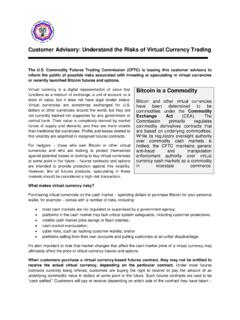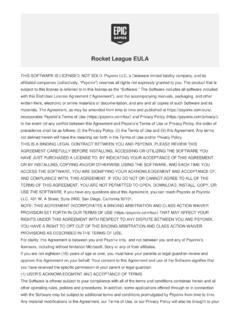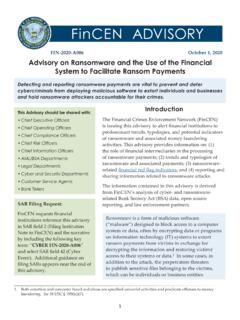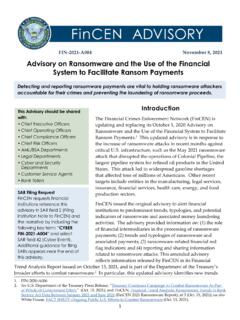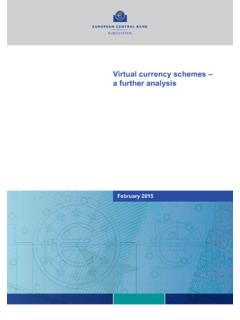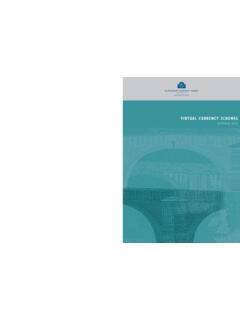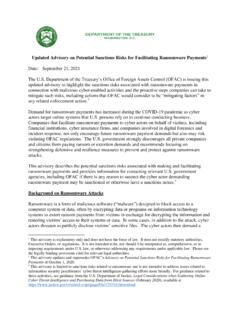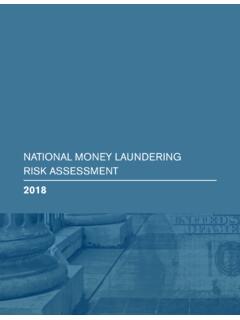Transcription of REPORTABLE IN THE SUPREME COURT OF INDIA CIVIL …
1 1 REPORTABLE IN THE SUPREME COURT OF INDIA CIVIL ORIGINAL JURISDICTION Writ Petition ( CIVIL ) of 2018 INTERNET AND MOBILE ASSOCIATION OF INDIA .. Petitioner Versus RESERVE BANK OF INDIA .. Respondent WITH Writ Petition ( CIVIL ) of 2018 J U D G M E N T V. Ramasubramanian, J. 1. THE STORY LINE: Reserve Bank of INDIA (hereinafter, RBI ) issued a Statement on Developmental and Regulatory Policies on April 5, 2018, paragraph 13 of which directed the entities regulated by RBI (i) not to deal with or provide services to any individual or business entities dealing with or settling virtual currencies and (ii) to exit the relationship, if they already have one, with such individuals/ business entities, dealing with or settling virtual currencies (VCs). 2 Following the said Statement, RBI also issued a circular dated April 6, 2018, in exercise of the powers conferred by Section 35A read with Section 36(1)(a) and Section 56 of the Banking Regulation Act, 1949 and Section 45JA and 45L of the Reserve Bank of INDIA Act, 1934 (hereinafter, RBI Act, 1934 ) and Section 10(2) read with Section 18 of the Payment and Settlement Systems Act, 2007, directing the entities regulated by RBI (i) not to deal in virtual currencies nor to provide services for facilitating any person or entity in dealing with or settling virtual currencies and (ii) to exit the relationship with such persons or entities, if they were already providing such services to them.
2 Challenging the said Statement and Circular and seeking a direction to the respondents not to restrict or restrain banks and financial institutions regulated by RBI, from providing access to the banking services, to those engaged in transactions in crypto assets, the petitioners have come up with these writ petitions. The petitioner in the first writ petition is a specialized industry body known as Internet and Mobile Association of INDIA which represents the interests of online and digital services industry. The petitioners in the second writ petition comprise of a few companies which run online crypto assets exchange platforms, the shareholders/founders of these companies and a few individual crypto assets traders. It must be stated here that the individuals who are some of the petitioners in the 3 second writ petition are young high-tech entrepreneurs who have graduated from premier educational institutions of technology in the country.
3 Contents of the impugned Statement and Circular of RBI: The Statement dated 05-04-2018 issued by RBI, impugned in these writ petitions, sets out various developmental and regulatory policy measures for the purpose of (i) strengthening regulation and supervision (ii) broadening and deepening financial markets (iii) improving currency management (iv) promoting financial inclusion and literacy and (v) facilitating data management. Paragraph 13 of the said statement which falls under the caption currency management deals directly with virtual currencies and the same constitutes the offending portion of the impugned Statement. Therefore, paragraph 13 of the impugned Statement alone is extracted as follows: 13. Ring-fencing regulated entities from virtual currencies Technological innovations, including those underlying virtual currencies, have the potential to improve the efficiency and inclusiveness of the financial system.
4 However, virtual Currencies (VCs), also variously referred to as crypto currencies and crypto assets, raise concerns of consumer protection, market integrity and money laundering, among others. Reserve Bank has repeatedly cautioned users, holders and traders of virtual currencies, including Bitcoins, regarding various risks associated in dealing with such 4 virtual currencies. In view of the associated risks, it has been decided that, with immediate effect, entities regulated by RBI shall not deal with or provide services to any individual or business entities dealing with or settling VCs. Regulated entities which already provide such services shall exit the relationship within a specified time. A circular in this regard is being issued separately. The Circular dated 06-04-2018 deals entirely with virtual currencies and the prohibition on dealing with the same. This Circular is statutory in character, issued in exercise of the powers conferred by (i) the Reserve Bank of INDIA Act, 1934 (ii) the Banking Regulation Act, 1949 and (iii) the Payment Settlement Systems Act, 2007.
5 This Circular in its entirety is reproduced as follows: Prohibition on dealing in virtual Currencies (VCs) Reserve Bank has repeatedly through its public notices on December 24, 2013, February 01, 2017 and December 05, 2017, cautioned users, holders and traders of virtual currencies, including Bitcoins, regarding various risks associated in dealing with such virtual currencies. 2. In view of the associated risks, it has been decided that, with immediate effect, entities regulated by the Reserve Bank shall not deal in VCs or provide services for facilitating any person or entity in dealing with or settling VCs. Such services include maintaining accounts, registering, trading, settling, clearing, giving loans against virtual tokens, accepting them as collateral, opening accounts of exchanges dealing with them and transfer/receipt of money in accounts relating to purchase/sale of VCs. 3. Regulated entities which already provide such services shall exit the relationship within three months from the date of this circular.
6 4. These instructions are issued in exercise of powers conferred by section 35A read with section 36(1)(a) of 5 Banking Regulation Act, 1949, section 35A read with section 36(1)(a) and section 56 of the Banking Regulation Act, 1949, section 45JA and 45L of the Reserve Bank of INDIA Act, 1934 and Section 10(2) read with Section 18 of Payment and Settlement Systems Act, 2007. 2. THE SETTING The Statement dated 05-04-2018 and the Circular dated 06-04-2018 of RBI, impugned in these writ petitions, were a culmination of a flurry of activities by different stakeholders, nationally and globally, over a period of about 5 years. Therefore, it is necessary to see the setting in which (or the backdrop against which) the impugned decisions of RBI were posited. While doing so, it will also be necessary to take note of the developments that have taken place during the pendency of these writ petitions, so that we have a close-up as well as aerial view of the setting.
7 It was probably for the first time that RBI took note of technology risks in changing business environment, in their Financial Stability Report of June 2013. Paragraph of this report noted that globally, the use of online and mobile technologies was driving the proliferation of virtual currencies. Therefore, the report stated that those developments pose challenges in the form of regulatory, legal and operational risks. Box of the said report dealt specifically with virtual currency schemes and it started by defining virtual currency as a type of unregulated digital money, issued and 6 controlled by its developers and used and accepted by the members of a specific virtual community. It was declared in Box of the said report that the regulators are studying the impact of online payment options and virtual currencies to determine potential risks associated with them.
8 In June 2013, the Financial Action Task Force (hereinafter, FATF ), also known by its French name, Groupe d'action financi re, which is an inter-governmental organization founded in 1989 on the initiative of G-7 to develop policies to combat money laundering, came up with what came to be known as New Payment Products and Services Guidance (NPPS Guidance, 2013). It was actually a Guidance for a Risk Based Approach to Pre-paid cards, Mobile Payments and Internet-based Payment Services. But this Guidance did not define the expressions digital currency , virtual currency , or electronic money , nor did it focus on virtual currencies, as distinct from internet based payment systems that facilitate transactions denominated in real money (such as Paypal, Alipay, Google Checkout etc.). Therefore, a short-term typologies project was initiated by FATF for promoting fuller understanding of the parties involved in convertible virtual currency systems and for developing a risk matrix.
9 On 24-12-2013, a Press Release was issued by RBI cautioning the users, holders and traders of virtual currencies about the potential financial, operational, legal and customer protection and 7 security related risks that they are exposing themselves to. The Press Release noted that the creation, trading or usage of VCs, as a medium of payment is not authorized by any central bank or monetary authority and hence may pose several risks narrated in the Press Release. On 27-12-2013, newspapers reported the first ever raid in INDIA by the Enforcement Directorate, of 2 Bitcoin trading firms in Ahmedabad, by name, and This was stated to be INDIA 's first raid on a Bitcoin trading firm and the second globally, after Federal Bureau of Investigation of the United States of America conducted a raid in October of the same year. Thereafter, a report titled virtual Currencies Key Definitions and Potential AML/CFT Risks was issued in June 2014 by FATF, highlighting, both legitimate uses and potential risks associated with virtual currencies.
10 What is of great significance about this FATF report is that it defined 2 important words. The FATF report defined virtual currency as a digital representation of value that can be traded digitally and functioning as (1) a medium of exchange; and/or (2) a unit of account; and/or (3) a store of value, but not having a legal tender status. The FATF report also defined Cryptocurrency to mean a math-based, decentralised convertible virtual currency protected by cryptography by relying on public and private keys to transfer 8 value from one person to another and signed cryptographically each time it is transferred. Again, in June 2015, FATF came up with a Guidance for a Risk Based Approach to virtual Currencies , which suggested certain recommendations, as follows: A. Countries to identify, assess and understand risks and to take action aimed at mitigating such risks.
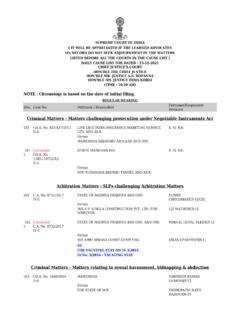
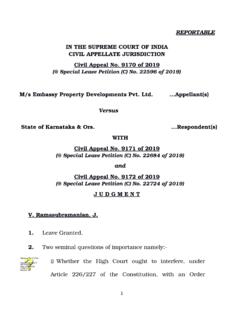
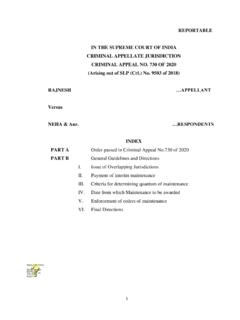
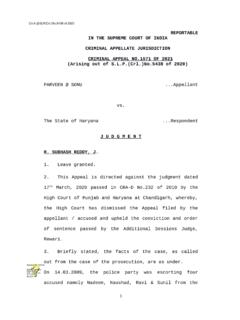
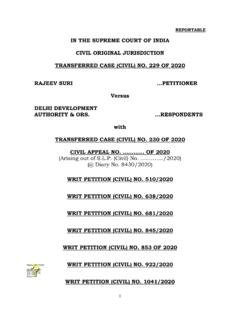
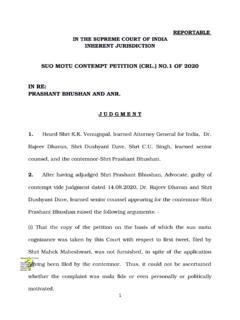
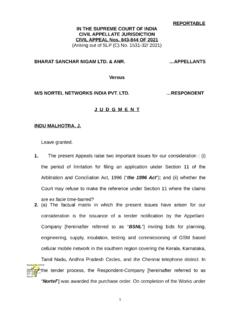
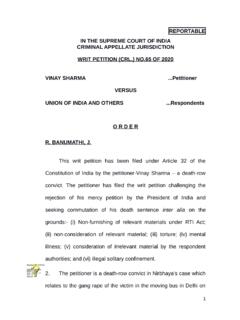
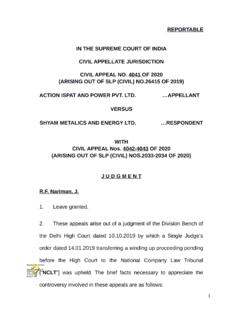
![[DEFAULT / OTHER MATTERS] [SERVICE/COMPLIANCE] …](/cache/preview/4/8/a/c/d/7/0/e/thumb-48acd70e206083f8f3d37421a64ec859.jpg)
